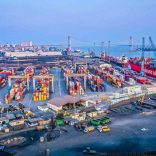Mozambique: State needs €2B for 2025-29 road, bridge building, maintenance - PM
Mozambique growth set to hit 15-year low: 4.2% in 2016 – EIU

Lusa (File photo) / Maputo's Xiquelene market
The Economist Intelligence Unit yesterday again revised downwards its growth forecast for the Mozambique economy to 4.2 percent, and says it thinks that the International Monetary Fund will resume funding to the country later this year.
“Real economic growth will be 4.2 percent in 2016, the slowest rate in 15 years. The expected slowdown reflects a further decline in public spending, less foreign investment and climate-related disruptions in agricultural production,” write British magazine The Economist’s economic analysis unit experts.
In the EIU country outlook sent to investors on Thursday which Lusa has access to, analysts speculate that Mozambique will accelerate structural reforms and that the IMF will resume financial support to the country towards the end of the year.
“GDP growth should gradually accelerate from next year to an average of 5.3 percent between 2017 and 2020”, the report adds, noting that economic growth, which is “well below the average growth of the last decade,” is based on increasing coal production.
In its political analysis, the EIU says the president will stay in power despite internal criticism and the ‘cases’ that have projected the country into the international spotlight, such as the “persistent outbreaks of political violence, allegations of human rights abuse and a lack of budgetary transparency”.
These factors will “hamper the relations of Mozambique with traditional development partners, especially the World Bank, the United States and the European Union,” says the EIU, which notes that the suspension of financial aid from donors are unlikely to be permanent because of “the high levels of poverty and the programs that are already underway.”
The government’s immediate political priority, the EIU says, is “to preserve debt sustainability”, following a deterioration of the fiscal position due to internal and external factors. “The liquidity crisis is expected to worsen after the revelation of the hidden loans but we hope that the Government will ensure the commitment to corrective policies, including budgetary and monetary tightening and structural reforms in public finance management”.
Analysts at the Economist acknowledge that “although there is a risk of overspending because of the political patronage system deeply rooted in Mozambique and weak institutional capacity”, they nevertheless hope that “the IMF resumes funding towards the end of this year”.
The EIU expects inflation to reach 13.1 percent this year, the highest since 2011, before declining to around 5 percent in 2020 due to the stabilization of the metical and the reduction of the budget deficit.












Leave a Reply
Be the First to Comment!
You must be logged in to post a comment.
You must be logged in to post a comment.